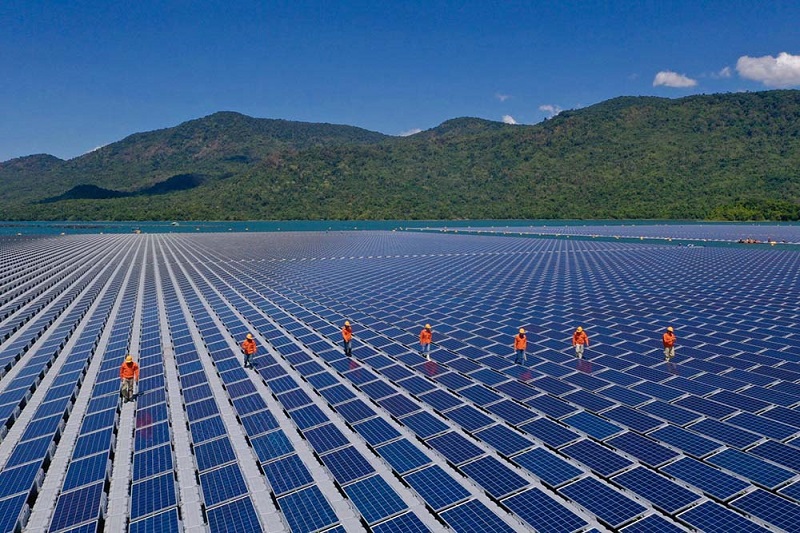Vietnam’s solar M&A set to heat up
Vietnam has officially overtaken Thailand to rank the largest solar market in Southeast Asia.
As the largest solar market in Southeast Asia for installed solar operational capacity, Vietnam is expected to see bustling mergers & acquisitons (M&A) in the solar power sector in the coming months.
| A floating solar power project in central Vietnam |
With more than 6,314 megawatts (MW) installed as of end-August 2020, this market is expected to add 7,000MW newly-approved capacity and 13,000MW awaits approval.
The landscape has fueled investors’ sentiment as they are believed to begin to assess risks from other perspectives instead of only focusing on the model power purchase agreement (PPA) bankability concerns.
Moritz Sticher, senior advisor for Berlin-based cleantech advisory Apricum has pointed out some reasons supporting the aforementioned idea.
Large supply of operational solar projects: roughly 2,988 MW of ground-mounted solar projects will potentially reach commercial operation date (COD) by the end of 2020, further adding to existing operational solar assets out of which many will be up for acquisition.
Unlike greenfield project acquisitions, for projects under development, which require consent of Vietnamese authorities and are difficult to execute, brownfield acquisitions of operational plants are far easier from a legal point of view and also reduce the risk of forecasting generation as real data already exists.
Vietnam Electricity (EVN)’s positive credit rating: In June 2018, Fitch assigned its first and positive credit rating of “BB” to EVN, which in April 2020 was confirmed with a stable outlook at the same level as the Vietnam sovereign rating.
Therefore, besides the model PPA, there is a high likelihood of EVN honoring payments under the PPA.
Vietnam’s reliance on foreign direct investment: Vietnam relies heavily on foreign direct investment (FDI) to grow its economy and is one of the most open economies in the world.
Any negative headlines in the power sector would likely damage this reputation and be against Vietnam’s own strategic interests of further attracting FDI in the sector that urgently requires more foreign capital.
Growing appetite by foreign lenders: As shown, the first large projects have received loans from international financing institutions – a trend likely to continue as there seems to be a growing appetite to finance such projects and lenders are starting to get familiar with assessing and mitigating underlying risks.
Projected scarcity of electricity in Vietnam: Vietnam will face severe power shortages from 2021 onwards when electricity demand will outpace the construction of new generation capacity.
Again, Vietnam can hardly afford to scare off foreign investors, who are much needed for investing in new generation capacity and expanding the still underdeveloped transmission line system.
Attractive electricity tariffs: Compared to other solar projects in the regions and potential future tariffs in Vietnam under announced competitive selection processes, the tariffs awarded under both feed-in-tariff (FiT) phases are high, allowing for relatively high returns.
Outlook of competitive selection process: The announced competitive selection process will likely make it more difficult for developers looking to sell projects post completion to participate in, leaving the market to large independent power producers (IPPs) that would hold onto these assets for a long period of time and effectively reduce numbers of projects up for acquisition.
For these reasons, the M&A market for solar projects in Vietnam offers many opportunities, but time is of the essence to secure the best projects now coming online.
Hindrances
However, there remains several factors rooted in multiple areas naturally impact the M&A activity. These include:
Covid-19: Many ongoing M&A transactions have stalled or have been cancelled because of the pandemic, forcing Vietnamese project owners to adjust their strategies.
Fair development premiums and financial feasibility: Due to the described tedious, costly and risky development process, developers require higher development premiums that most investors consider reasonable at the presented level of return and risk – a situation that also worsened through Covid-19 resulting in increased development period and costs for many developers. For projects that have been developed under the FIT phase 1 and could not reach COD by June 2019, the mismatch from the FIT phase 2 tariff or other prospective mechanisms is especially pronounced.
Regulatory uncertainty: While the regulatory uncertainties discussed above mostly impact developers, there is always a risk that governments apply retroactive changes to past programs when the costs are perceived as too high that seen in other countries before.
Model PPA and bankability: As it is for developers, this risk is adversely affecting investment decisions due to unresolved bankability concerns.
Limited access to non-recourse financing: As it is for developers, the financing landscape is still lacking large-scale involvement of the international project financing community, with some large projects, mostly in co-financing constructs with ADB, taking the lead.
Environment and social (E&S) concerns: Some renewable energy projects (especially in hydropower) are lacking required documentation and due diligence on E&S aspects, which present red flags to institutional investors and lenders.
Lack of standardized M&A processes: Clear and standardized M&A processes and related documentation e.g., teaser, investment memo, financial models, structured data room with English documents etc., are yet to be established in Vietnam as most sellers lack experience and gathering of information is arduous.












